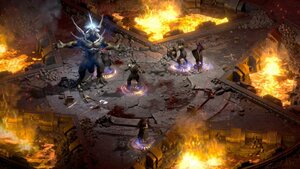-
 Find in Members
Find in Members Find in Videos
Find in Videos Find in Channels
Find in Channels
This website uses cookies to ensure you get the best experience on our website.
To learn more about our privacy policy Click herePrivacy Preference
- Tags - #P2Pah cheap D2R Items
-
- Last updated April 23, 2023 0 comments, 82 views, 0 likes
More from Nfkja sfas
More in Politics
Related Blogs
Archives
The economy of Diablo Immortal is like a monstrous
Posted By Nfkja sfas
April 23, 2023
Body
A mysterious specialist in the portable game industry as of late told me D2R ladder items, "Confusing money is a typical strategy for versatile games or any game with microtransactions." I might, for instance, receive gold and jewels if I spent $1.
As there is no one-to-one conversion, concealing the actual cash value spent is helpful. In addition, we purposefully placed worse deals alongside other deals in order to make the other deals appear to be more lucrative and to imply to players that they are more intelligent by saving for the better ones.
“At the company I worked for, we had weekly events with unique prizes that required rare in-game currency to complete, giving you a chance to win one of the main prizes. However, in addition to the main prize, designers were required to include additional milestone prizes that typically required real money to advance in the event.
Naturally, one of our numerous milestones and metrics for determining an event's success is the amount spent. We did measure sentiment, but I think the higher-ups were always more concerned with whether the event led to spending.
Real-money transactions are nothing new by any stretch of the imagination. To claim that Diablo Immortal was the first to employ them would be dishonest. The root cause is the worst mashup of hundreds of free PC and mobile games, not Blizzard's action RPG. The economy of Diablo Immortal is like a monstrous mobile marketplace with two distinct Battle Passes buy d2r items, each with its own rewards specific to a character (rather than your entire roster), and too many distinct currencies for the average player to manage.
As there is no one-to-one conversion, concealing the actual cash value spent is helpful. In addition, we purposefully placed worse deals alongside other deals in order to make the other deals appear to be more lucrative and to imply to players that they are more intelligent by saving for the better ones.
“At the company I worked for, we had weekly events with unique prizes that required rare in-game currency to complete, giving you a chance to win one of the main prizes. However, in addition to the main prize, designers were required to include additional milestone prizes that typically required real money to advance in the event.
Naturally, one of our numerous milestones and metrics for determining an event's success is the amount spent. We did measure sentiment, but I think the higher-ups were always more concerned with whether the event led to spending.
Real-money transactions are nothing new by any stretch of the imagination. To claim that Diablo Immortal was the first to employ them would be dishonest. The root cause is the worst mashup of hundreds of free PC and mobile games, not Blizzard's action RPG. The economy of Diablo Immortal is like a monstrous mobile marketplace with two distinct Battle Passes buy d2r items, each with its own rewards specific to a character (rather than your entire roster), and too many distinct currencies for the average player to manage.









Comments